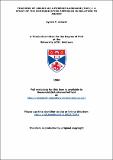Teaching of Arabic as a foreign language (TAFL) : a study of the communicative approach in relation to Arabic
Abstract
The study is concerned with the problem of how to improve the teaching
of Arabic as a foreign or a second language. It lays down some of the
essential foundation-work necessary for bringing about systematic and
constructive improvements in the teaching of Arabic as a foreign language
(TAFL) by investigating the contributions of modern linguistic sciences
(such as applied linguistics, educational linguistics, psycholinguistics
and sociolinguistics) to the development of foreign language (FL) teaching
and learning. A survey of the literature indicates that a 'revolution' is
currently taking place in FL teaching and that a new approach, known as
the Communicative Approach (CA), has begun to emerge and influence the
teaching of FLs in general, over the last decade or so. Since the CA
is currently being adopted to the teaching of most major FLs and since
this revolution has not yet had much impact on TAPL, the study explores
the possibility of the application of the CA to the teaching of Arabic as
a living language.
The thesis is divided into 7 chapters. Chapter 1 introduces the importance
of viewing the nature of language and FL teaching from a multidimensional
point of view. Chapter 2 outlines the general nature and importance of
the subject matter (i.e. the Arabic language) in a wide context. In order
to understand what has directly or indirectly influenced the teaching
practices of TAFL, Chapter 3 provides an overview of the development of
views of FL teaching approaches and methods in recent times, from
formalism (teacher-centred learning) to functionalism (student -centred
learning). Chapter 4 concentrates on providing an interpretation of
the current 'state of the art' of TPPL in Britain. A theoretical outline
of the CA is presented in Chapter 5. This chapter provides a working
hypothesis of a proposed integrative model for communicative competence
that can be used as a practical reference tool in the relevant areas of
communicative language development In TAPL. Chapter 6 focuses on
one of these areas; communicative syllabus design, in which the stages
in Arabic language programme development and types of communicative
syllabuses are discussed. The last chapter concludes with a suggetion
of specific further research needs in TAFL: communicative teaching
methodology, communicative materials development, communicative
testing techniques and communicative tea cher training.
Type
Thesis, PhD Doctor of Philosophy
Collections
Items in the St Andrews Research Repository are protected by copyright, with all rights reserved, unless otherwise indicated.

